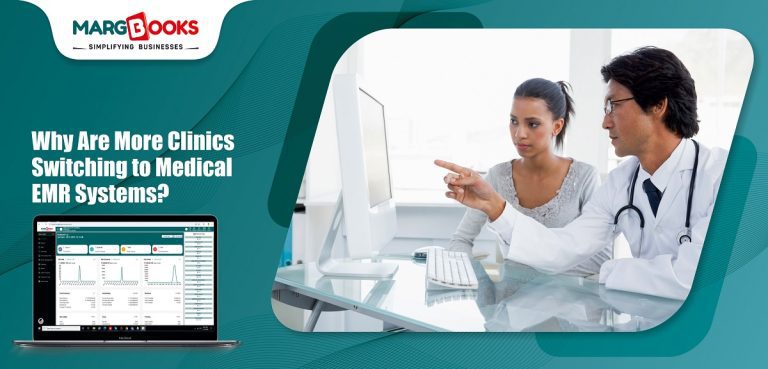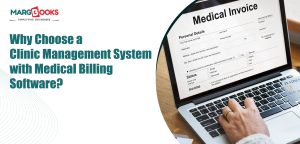In recent years, there has been a significant shift in the healthcare industry towards digitization. One of the most prominent changes is the increasing adoption of medical EMR systems by clinics and healthcare providers. Electronic Medical Records (EMR) have emerged as a game-changer in the healthcare sector, offering an array of benefits that enhance both patient care and operational efficiency.
But why exactly are more clinics switching to medical EMR systems? In this blog, we’ll explore the key reasons behind this transition and how it’s reshaping the healthcare landscape, especially in India. We’ll also touch upon how software solutions like Best Pharma billing software and cloud-based pharmacy software are contributing to this digital revolution.
What are Medical EMR Systems?
Before diving into the reasons for the switch, let’s understand what medical EMR systems are. EMR systems are digital versions of the paper charts in a clinician’s office. They contain the medical and treatment history of patients, including:
- Prescriptions
- Diagnoses
- Treatment plans
- Immunization dates
- Allergies
- Laboratory test results
These records are used by healthcare providers to track a patient’s health over time and ensure better coordination of care.
Why Are Clinics Moving to Medical EMR Systems?
The transition from traditional paper-based record-keeping to medical EMR systems is happening at a fast pace. Let’s examine some of the key reasons behind this shift:
1. Improved Patient Care
One of the primary reasons why clinics are opting for medical EMR systems is to improve patient care. With digital records, doctors can quickly access a patient’s medical history, which leads to more accurate diagnoses and faster treatment. Real-time access to medical data enables healthcare providers to make informed decisions, reducing the chances of errors.
2. Increased Efficiency
Medical EMR systems streamline many administrative tasks that would otherwise consume a lot of time. For instance, scheduling appointments, maintaining records, and billing can all be automated through these systems. This reduces the workload on healthcare staff and minimizes human errors, enabling them to focus more on patient care rather than administrative tasks.
3. Data Security & Privacy
In an era where data breaches and cyber-attacks are increasingly common, data security is a top priority for clinics. Medical EMR systems ensure that patient data is securely stored and protected from unauthorized access. With encryption protocols, secure cloud storage, and audit trails, clinics can comply with data privacy regulations, such as the Health Insurance Portability and Accountability Act (HIPAA).
4. Cost Savings
While the initial investment in medical EMR systems may seem high, in the long run, it can save clinics a significant amount of money. By reducing the need for physical storage, paper, and printing supplies, clinics can save on administrative costs. Furthermore, EMR systems reduce the time spent on managing patient data, which translates into better productivity and reduced operational costs.
5. Easy Access to Patient Data
Another advantage of medical EMR systems is the ability to provide healthcare professionals with easy access to patient data. Whether a doctor is at the clinic, at home, or on the go, they can access the patient’s medical records from any device, provided there’s internet access. This improves the overall convenience and flexibility of healthcare services.
6. Integration with Pharmacy Management Systems
A critical component of healthcare is the pharmacy, and EMR systems can integrate seamlessly with Best Pharma billing software cloud based pharmacy software and cloud-based pharmacy software. This allows clinics to manage prescriptions, inventory, and billing in real time, ensuring smooth operations and reducing the chances of mistakes.
7. Regulatory Compliance
In India, healthcare providers must comply with various regulations, including those set by the National Digital Health Mission (NDHM) and the Indian Medical Association (IMA). Switching to medical EMR systems makes it easier to adhere to these regulations, as most EMR systems are designed to meet local and international healthcare standards.
The Role of Best Pharma Billing Software in EMR Systems
When it comes to managing pharmacy-related operations, Best Pharma billing software plays an essential role in the broader ecosystem of medical EMR systems. By integrating pharmacy billing systems with EMR, clinics can ensure that the billing process is more accurate and efficient.
Some of the benefits of using Best Pharma billing software include:
- Real-time billing: The software updates prescriptions and billing data in real time, ensuring that patients are billed correctly.
- Inventory management: The software tracks drug stocks, automatically reordering when supplies are low, preventing shortages.
- Insurance claim support: It simplifies the insurance claim process by generating accurate reports for the insurance company.
- Compliance with regulations: Best Pharma billing software ensures compliance with local tax laws, including GST, which is particularly important in India.
Cloud-Based Pharmacy Software: The Future of Healthcare
As healthcare continues to move toward digital solutions, cloud-based pharmacy software is becoming an essential tool for clinics. This type of software offers a range of benefits:
- Remote accessibility: Cloud-based pharmacy software allows healthcare providers and pharmacists to access patient data and prescriptions from any location with internet access.
- Real-time updates: The system automatically updates prescriptions, inventory, and billing data, reducing human error and increasing efficiency.
- Scalability: Whether it’s a small clinic or a large hospital, cloud-based systems are scalable and can grow with the clinic’s needs.
- Cost-effective: By eliminating the need for expensive hardware and maintenance, cloud-based systems reduce upfront and ongoing costs.
How Margbooks Improves the Transition to EMR Systems?
Margbooks, a leading software solution for clinics and pharmacies in India, is helping healthcare providers smoothly transition to medical EMR systems. Margbooks integrates medical EMR systems, Best Pharma billing software, and cloud-based pharmacy software into one unified platform, making it easier for clinics to manage their operations and provide better patient care.
Some of the advantages of Margbooks include:
- Seamless Integration: Margbooks offers seamless integration between clinic management, pharmacy billing, and patient records.
- Real-Time Data: It provides real-time updates for prescriptions, inventory, and billing, ensuring that clinics can operate efficiently.
- Cost Savings: With its cloud-based platform, Margbooks helps clinics reduce infrastructure costs and improve overall profitability.
Conclusion
The shift to medical EMR systems is not just a passing trend; it’s the future of healthcare. By embracing these systems, clinics can provide better patient care, streamline operations, reduce costs, and ensure regulatory compliance. The integration of Best Pharma billing software and cloud-based pharmacy software further enhances the efficiency of these systems, making healthcare management more accurate and less prone to human error.
For clinics looking to make this transition, platforms like Margbooks provide an integrated solution to manage EMR, pharmacy billing, and much more, helping clinics deliver world-class care in the digital age.
Switching to medical EMR systems is no longer an option—it’s a necessity for the modern healthcare system. As technology continues to advance, clinics that embrace this change will be better equipped to meet the evolving needs of their patients and stay ahead of the competition.




